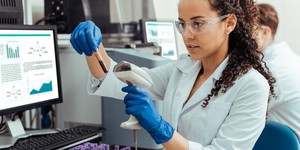Health Careers (44 results)
|
Select a resource
Filter by
Sort by
|
Career Profile
Have you ever tried to read a scientific or technical article in a professional journal? They can be hard to decipher because they are full of technical terminology. But have you ever read a science article in a magazine that was geared for your age or for the general public? These tend to be a lot easier to read and more interesting because they have been written by a science writer. A science writer can take a complex subject and write a concise article in language that is easy for…
Read more
Career Profile
Every surgical procedure, whether minor or major, requires a team of detail-oriented professionals, including the surgical technologist. From cleaning and setting up surgical equipment to assisting the medical team, the surgical technologist helps each surgery run smoothly. Job opportunities for surgical technologists continue to grow with advances in surgical techniques and technology.
Read more
Career Profile
On each side of your head is the auditory system, one of the most beautifully designed organs in the human body. The auditory system not only detects sound, but is closely tied to the vestibular system, which helps a person with balance, and knowing how his or her body is moving through space. Audiologists detect, diagnose, and develop treatment plans for people of all ages who have problems with hearing, balance, or spatial positioning. This important work impacts how well a person is able to…
Read more
Career Profile
Who does a diabetic turn to if they have questions or do not understand how to manage their disease? They consult a certified diabetes educator. These diabetes experts work with people who have diabetes (or pre-diabetes) so they know how to manage their condition. This can include educating people about how to measure and control their blood sugar levels, giving specific diet and exercise recommendations, and providing emotional support. Certified diabetes educators present health…
Read more
Career Profile
When a patient gets sick, his or her doctor will take sample cells from the affected part of his or her body and send them to a lab for testing to figure out what is wrong. This is where the cytotechnologist steps in. The cytotechnologist will take the sample cells, make slides from them, and examine the slides under a microscope. Cytotechnologists are trained to detect abnormalities in cells that come from all body sites in order to to make a diagnosis of cancer or other diseases. These…
Read more
Career Profile
Hormones may be small, but they affect our bodies in huge ways. (For example, growth hormone can affect how tall someone grows, and how strong their bones are.) Endocrinologists know this well. Endocrinologists are medical doctors who specialize in diagnosing and treating conditions related to the endocrine system, which secretes small chemicals called hormones. Endocrinologists also investigate ways to improve diagnoses of and treatments for these conditions.
Read more
Career Profile
Have you ever heard the expression "Prevention is the best medicine"? Prevention is the fundamental work of all health educators. They attempt to prevent illnesses or diseases in individuals or entire communities through education about nutrition, exercise, or other habits and behaviors. Health educators present scientific information in ways that their audience can relate to, and are sensitive to cultural differences. They are the cornerstone of the public health system, improving health and…
Read more
Career Profile
Doctors need information to decide if a person is healthy or sick, if a baby's earache is bacterial or viral, or if the man next door needs medication to lower his cholesterol and prevent a heart attack. The information often comes in the form of results from lab tests. Medical and clinical laboratory technicians are the people who perform these routine medical laboratory tests, giving the doctors the information needed to diagnose, treat, and prevent disease.
Read more
Career Profile
Think of all the things you do as you go about your day, like putting on your shoes, buttoning your shirt, turning on a faucet, typing on a keyboard, going grocery shopping, picking up laundry, making a sandwich, or using a spoon. Now imagine trying to maintain your independence if an injury or illness made it difficult for you to use your hands, move your arms, or even walk. Occupational therapists are the healthcare providers who help people regain independence by developing or restoring…
Read more
Career Profile
Pharmacy technicians play a very important role at a pharmacy. Pharmacy technicians help pharmacists in many different ways. They make sure a pharmacy runs smoothly every day. They may have a role in customer service by taking personal information, answering questions, and taking payments. A technician can measure or mix drugs and package and label containers. They may also count all of the medications to let the pharmacists know if there are low stock items. Pharmacy technicians can work in a…
Read more
|














